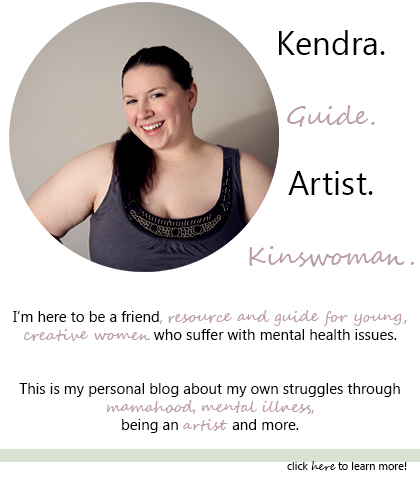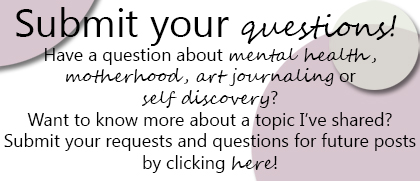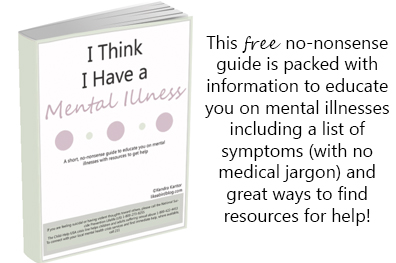The Real Faces of Mental Illness is a monthly interview series from real people sharing their personal stories and experiences. I want to show people what it’s really like to have a mental illness and not hide behind medical terms and symptoms. I want to share what it’s like to live with these diseases, on a day to day basis and how it really looks and feels and what recovery really involves. I want to share the real face of mental illnesses.
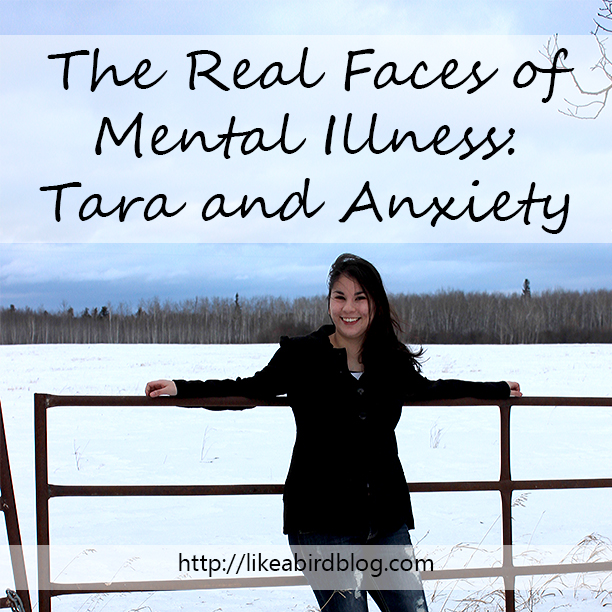
Can you tell us a bit about yourself? (name, age, job, hobbies etc)
Hello! My name is Tara Everett and I’m a 20-something year old living in Saskatchewan, Canada. I commute to Alberta (which is a big 20kms to the border) for work as an employment counselor with a non-profit Metis company.
I’m not much of a hobby person but I like to fill my time coddling my animals, babysitting and hanging out on social media. If I’m feeling really motivated I like to walk and pick up empties or go running. In addition to my diagnosis of anxiety I also suffer from depression, ADHD, learning disabilities and exhibit symptoms of somatization, obsessive-compulsive, interpersonal sensitivity, psychoticism.
For those who don’t know, what is anxiety?
As per definition from dictionary.reference.com
anx·i·e·ty
/æŋˈzaɪɪti/ Show Spelled [ang-zahy-i-tee] Show IPA
noun, plural anx·i·e·ties.
1.distress or uneasiness of mind caused by fear of danger or misfortune: He felt anxiety about the possible loss of his job.
2.earnest but tense desire; eagerness: He had a keen anxiety to succeed in his work.
3.Psychiatry. a state of apprehension and psychic tension occurring in some forms of mental disorder.
Anxiety can effect different people in different ways so it’s a really subjective subject for most suffers.
What does anxiety feel like for you?
My anxiety typically manifests itself in different ways depending on why I’m experiencing it. Generally I have sleep issues (insomnia, night terrors, inability to stay asleep), irritability, muscle tension which results in migraines and headaches and concentration problems. If I’m having a really bad spell I can have panic attacks where my body tenses to the point where I can’t move and have difficulty breathing. I also have stomach issues which can be mild or where I get a suppressed appetite or have to run to the washroom.
What do you wish people knew about anxiety?
Mental illness in general should never be a defining factor of your life. It also should never be marginalized. It’s a very real medical issue just like a broken leg or heart attack (Fact: Some first time suffers of panic attacks believe that they are experiencing a heart attack.). It’s scary but there are others out there and supports to guide you.
When did you first realize that you were struggling with anxiety?
In hindsight I began exhibiting symptoms as young as around 5 – Yes 5. I used to get morning sickness before school that when I was older my mom and I recognized as anxiety because I was bullied.
Have you been officially diagnosed by a doctor? If yes. what symptoms or events in your life led you to being tested? How has the official diagnoses affected your outlook on yourself, and your treatment?
I fought for my diagnosis – hard. It was a really traumatic experience that has led to me being very distrustful of most people in the health profession. In the end I had doctors just listen to me and send me on my way until I paid $1200 for a physco-educational assessment mid-2013.
My symptoms stem into my childhood but after a dark period in my life I took charge. The result has been empowerment and understanding of a lot of things that impacted me in my past. Now that I have my history in place, doctors take me a lot more seriously and in turn I feel a lot better about my future.
Have you sought treatment? Are you currently in therapy or on medication? How does that help your illness and day to day life?
I’ve been actively treated for depression and anxiety (the two often go hand in hand) since I was about 19. I’ve been on a slew of different medication but currently I use Cipralex 20mg daily and .5mg of Clonazepam when I have my attacks or am expecting a situation (think busy places, interviews or presentations). I also have therapy with a counselor and regularly update my physician.
Daily my symptoms are somewhat controlled with my medication and it helps knowing I have my counselor should anything come up. It will be a very long road to recovery for me because my anxiety is very deep rooted and I have a strong family history of mental illness.
If you are currently on medication or have been in the past, what were they and what side effects did you encounter?
Oh boy. I’ve been on anywhere between 10-12 different medications at different strengths. I am very sensitive to medications and will almost always get adverse reactions so it’s been quite the journey.
I can’t remember them all but most recently I was taken off Effexor (250mg/daily) because it was making me nauseated for most of the day. I’m currently on Cipralex (20mg/daily) and no side effects so far.
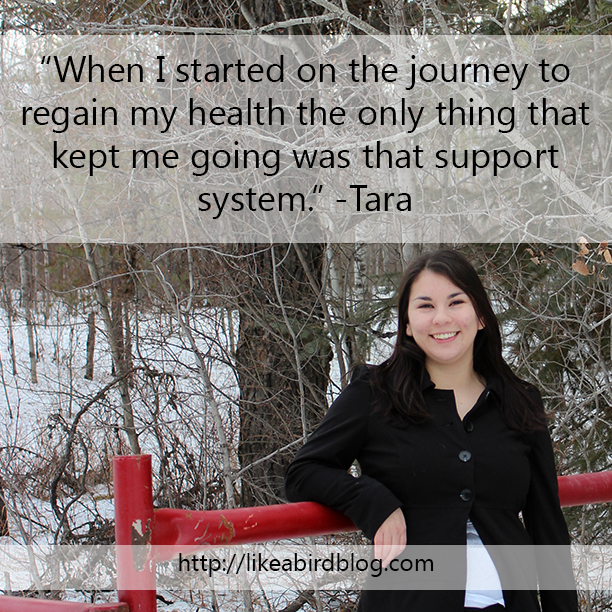
How has anxiety affected your life? What routine event do you find you have the most trouble with? (example: day to day daily habits). How has it affected your relationships (with your family, your friends, your significant others)?
Anxiety means I get overwhelmed very easily with day to day activities. I’m very fortunate to have a very supportive workplace and if I get overwhelmed management is about to provide me supports (work plans, have a co-worker assist, understand it takes me longer to do tasks). This also applies at home with housework especially because I also suffer from ADHD.
I have an incredible boyfriend, friends and family support system even though I live 1000+km away from them. When I started on the journey to regain my health the only thing that kept me going was that support system. I’m very good at hiding most of my symptoms and was deeply embarrassed until they reached out and encouraged me to continue.
I can’t forget my dog – Kempo the toothless pug. I adopted him shortly before (pardon my French) shit hit the fan. He is the most loyal companion and there was a time where I only lived for him.
What are your personal triggers? How have you learned to deal with them?
Still trying to iron most of those out but some are;
-Busy places with lots of people
-Approaching something without feeling 100% confident and educated.
-Changing dynamics in relationships.
-Exams, reviews and projects.
This are my strongest triggers and normally require me to either leave the situation, take medication or have outside help assist me to work through it.
What coping mechanisms have you tried and what has worked the best for you personally?
Medication – It has taken me until recently to find the right medication for me. I’ve often thought about trying to get off it but I know that right now it’s keeping me centered.
Outreach and Support – I’ve dreamed of sharing my story with others and now that I’ve embraced it more through my blog, Twitter and in day to day environments it’s been a powerful tool of healing and empowerment.
Exercise – Kind of not really. I love the rush I get when I work out but currently my anxiety is a powerful opponent in terms of stopping me from going to the gym. I live in a tiny community of 500 people so if I want to attend classes I have to travel 20 minutes in good weather to get to those resources.
Sleep – I have a defined sleep routine and schedule. When I have a bad mental health day it’s important for me to get extra sleep so that my body can rest.
How do you define the word ‘wellness’? How do you focus on your personal wellness?
Wellness to some can be “being cured”. For me wellness is a day where my symptoms are controlled. I focus on my personal wellness through remembering to take my medication, not being hard on myself and setting attainable goals.
Have you experienced stigma or bullying? How do you deal with it?
I was bullied throughout elementary and high school. This was a contributing factor in my depression and anxiety. I learned to hide and ignore my symptoms until I got older because I couldn’t reach out and when I did I was either ignored or told it was a phase.
What does your support structure look like? Do you have people in your life who are accepting and loving but don’t have a mental illness themselves and if so, how have they come to understand your illness?
It took a long time for my family to understand my illness. They were about as in the dark as I was. A great example is during family gatherings I used to disappear to play on my phone or watch tv in my room not realizing that because I felt overwhelmed my natural response was to hide – I got a lot “talking’s” for that.
Since then I’ve been very open and it’s still hard for a couple people to understand so they either ignore the subject entirely or in some cases deny that it’s a problem at all. I find that really hurtful so I try my best to ignore it. On the other hand I have family coming to me for information about supports and resources as well as overall acceptance. It’s a great feeling.
My boyfriend joined into the party that is my mental health journey shortly before I started taking things seriously. He isn’t polar opposite to me but he’s great at giving me a perception check and refuge when things get tough.
Ah my friends! When I started getting serious I lost a great deal of good longtime friends. It’s still sensitive for me because I miss them. I’m lucky to have other friends that have been important to me and understanding towards my interesting nuances (think running to the bathroom during exams, texting at 3am to discuss my life etc.)
How has having anxiety changed your perspective about life, creativity, love, etc?
I wouldn’t say that it’s changed my perspective outside of giving me a false image of normalcy. Everyone is different and that’s ok – myself included. In the past I’ve tried very hard to be something I’m not and it hurt a lot of people.
What advice would you give to someone struggling with anxiety?
You’re not a write-off. If people don’t believe you or support you as hurtful as it is – let them. It’s ok to focus on you because I can guarantee you likely don’t to begin with. Understand that medication and therapy take time to sort out and the road to wellness isn’t always easy or fast.
What resources (books, websites, doctors etc) have been the most helpful in educating yourself about your own and other mental illnesses?
I gallivant the world online almost exclusively for material but I don’t have specific resources that I would suggest. Everyone is different but I like the personal aspect of blogs, social media and forums.
Do you believe it is it possible to ‘cure’ anxiety? Do you think you can live a happy and fulfilling life even if you can’t ever be cured?
I believe that you can live a normal life even with anxiety. I believe that peoples definitions of ‘cured’ will always be different but for me I don’t believe I will. I’m ok with that because it doesn’t define me as a person and by accepting that it will always be there I’m making permanent changes so that it doesn’t impact me daily.
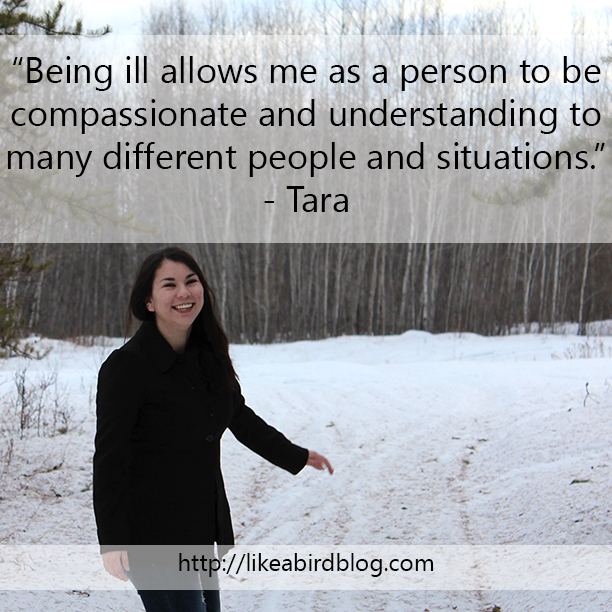
How do people react when you tell them/they find out you have anxiety?
I’m a very open book so when people find out they’re normally inquisitive and open to learning more. They also tend to be surprised because I’m not falling apart in front of them.
What are the biggest misconceptions you’ve encountered when talking to people about anxiety?
That you can’t lead a normal healthy life and that you’re doomed for employment.
Do you know anyone else with the same mental illness as yourself? If yes, how do you find your symptoms, experiences and treatments differ?
I have quite a slew of diagnosis’ so I’ve never encountered someone with the exact same illness’ as I. I think I find solace in the fact that depending on the person and the diagnosis we always have something similar to share and knowing that everyone’s path is different.
Do you use creativity in any form to improve your mental health?
Overall I’m a highly creative person but outside of writing I don’t use many other methods to improve my mental health.
Do you see having a mental illness as a curse or a gift? Or both? Why?
I would say both. I’ve met so many people as time has gone on and in turn have joined passionate communities of people. Being ill allows me as a person to be compassionate and understanding to many different people and situations. My anxiety does pose a problem in the work place sometimes or when I have to make important decisions but I’m working on that.
About Tara:
I’m very active on twitter and I’ve started to blog about my experiences at achikadeestory.
I was a foster child from the age of 3 months-10 years old. I was with the same foster family from 3 months on until I was adopted by them. I have a large extended family. I had an open adopted and know my birth mother and brother. I met my birth father when I was 13. We all still somewhat keep in touch.
I was diagnosed as failure to thrive as an infant and was in different therapies until I was 5.
I’m First Nations.
I have this incredible tattoo that symbolizes my family, fight against depression and hope. I intend on getting a lot more that touches on my journey.

Thank you, Tara for sharing your story and being so open and honest with us!



